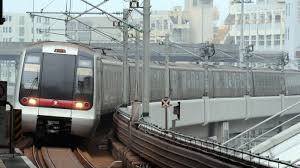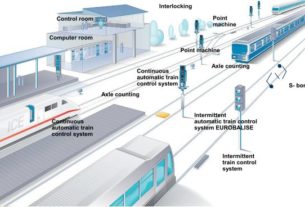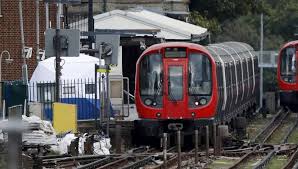Metro Rail occurrences Flooding unsafe conditions
Unusual occurrences – (1) All Metro Railway employees shall be conversant with the location and use of fire alarms and fire fighting equipment at their place of work.
(2) All Metro Railway employees observing the smoke or fire shall raise the alarm by means of the equipment provided or by informing the Station Controller and Traffic Controller as may be most appropriate and expeditious.
(3) If smoke or fire is reported on a train between stations, the Train Operator shall inform the Traffic Controller, drive his train to the next station and detrain passengers. Traction power shall then be switched off, and in overhead traction territory the pantographs of the affected train lowered, or in the third rail traction territory the current collection devices of the affected train retracted before traction power is restored to other trains.
(4) If the fire on a train or on the track causes a train to stop between the stations, passengers shall be evacuated as per the provisions specified in sub-rules (3) to (8) of rule 50, as applicable.
(5) If the incident occurs in a tunnel, the Traffic Controller shall arrange with the Auxiliary Systems Controller for the ventilation system to supply fresh air to the chosen route for evacuation before authorizing detrainment of passengers.
(6) If the fire alarm on a station is actuated or a verbal report is received of smoke or fire on the station, the Station Controller shall inform the Traffic Controller and then verify for himself by closed-circuit television or actual inspection whether or not the alarm is genuine.
(7) If smoke or fire is present, the Station Controller shall inform the Traffic Controller and arrange for passengers to be evacuated from the area concerned preventing further access and if necessary, the station may be completely evacuated and the traffic controller may be requested to arrange for trains not to stop.
(8) The Traffic Controller shall inform the Chief Controller who shall arrange for the attendance and assistance of the fire fighting services and if necessary the ambulance services.
(9) If a Train Operator or Station Controller observes a fire in adjacent premises that could affect the property of the Metro Railway he shall report the circumstances to the Traffic Controller and the Traffic Controller shall inform the Chief Controller and the Security Controller and maintain normal services unless or until a local inspection confirms that a potential danger exists.
Metro rail safety training – Metro Rail occurrences Flooding unsafe conditions
Flooding –(1) Any Train Operator or Station Controller or the other member of the staff, who observes water accumulating on the track, shall report to the Traffic Controller giving as much detail as possible with respect to location, a distance of track affected, and approximate level of water with respect to the rail.
(2) The Traffic Controller shall inform all trains required to pass through the area and requests reports of the state of the water level and if the water level is below the level of rail fastenings, the Traffic controller shall instruct the Train Operator to reduce the speed of their trains to twenty-five kilometer per hour when passing through the affected area.
(3) If the water level rises above rail fastenings, passenger train service shall only be permitted under special instructions.
Other unsafe conditions – (1) All Metro Railway employees, and, in particular, Train Operators and Station Controllers shall keep a lookout for unsafe conditions on or in the vicinity of the railway track which are as follows:-
(a) damaged or dislodged fixed equipment within the railway right of way.
(b) broken or buckled rails.
(c) displaced or damaged overhead traction power conductors or third rail power conductors, as the case may be;
(d) construction activities adjacent to the track including the use of cranes which can swing within 6 meters of the track;
(e) road accidents that might cause or have caused damage to bridges and viaducts.
(f) road accidents which might cause or have caused vehicles or their loads to encroach on the metro railway right of way. and
(g) any other obstruction on the track.
(2) If the Train Operator observes any unsafe condition, he shall report to the Traffic Controller immediately so that action can be taken to minimize the effect and remove the cause.
(3) In the event of an earthquake, the Traffic Controller shall instruct all trains to stop immediately and after such earthquake has subsided, the Traffic Controller may instruct each stranded Train Operator to proceed in Restricted Manual mode at walking speed after examining that the track is safe for train movement and free from obstruction up to the next station: Provided, that in such event, the normal operation of trains may be resumed if all the track and structures are examined, as per Special Instructions.


